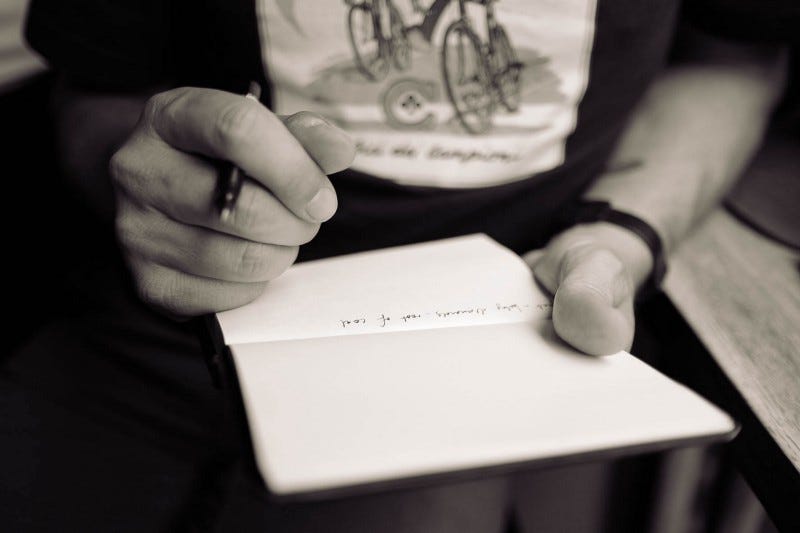How To Write While Traveling Or Otherwise Distracted: 7 Strategies
I am distracted. Last week was my birthday and I did lots of celebrating. And my thoughts are also, I will admit, are on France these days…
I am distracted. Last week was my birthday and I did lots of celebrating. And my thoughts are also, I will admit, are on France these days. Every September I teach a writing workshop there and as summer marches on, we get closer to my departure date. So I am distracted. And when I am there I will be distracted. (Because, the south of France, people. Paris. Collioure.)
And yet, I am still doing my best to write regularly. Why? Because I am a masochist. No, really, its because I feel weird when I’m not writing. Antsy. A little anxious. Like something is missing in my life. Like my best friend is gone. (I felt this way for a year after I quit smoking but that’s another story.)
I just feel better when I am writing, period.
You may be distracted, too. By summertime travel. Or small children (as I used to be 24–7 for what seemed an eternity and now am again since my daughter and her husband and two adorable boys are living with us). Or those pesky day jobs. Or caring for an aging parent. Or any number of the things that we deal with in life.

I know plenty of people who just set their writing aside when they get overwhelmed with distraction. But I’m here to advocate that you do not do this. Because time is precious, and short. Because if you set your writing project aside, when you return to it, you’ll have to spend lots of that precious time getting yourself up to speed. And because, writers write. Period.
So how shall we manage when the baby wakes up at 3 AM crying, or the hospital calls to tell you your mother has just arrived in the ER again, or you have to stay at work until 11 to finish something? Or you just might get to go to an exotic foreign land? Here’s how:
Use what you’ve got in front of you. When you’re traveling, this is obvious. Everything is bright and shiny and new and different and it is relatively easy to write about it. But it might not be so evident with the less positive distractions in your life. So, write about how exhausted you are as the mother of a newborn, how worried you are about your parent, how much you loathe your job. Of such conflicts many books have been born.
Take advantage of odd bits of time. Because, they may be all you have. So maybe you’ve got a chunk of time while you are riding the high-speed train from Paris to Perpignan but you fall asleep because you’re so jet-lagged so you only end up having twenty minutes. Or you have fifteen minutes in the morning when you wake up before the rest of the house. I know it doesn’t seem like much, but let me share a little secret: I get more done with I have less time. On the days when I have all day to write I fart around. I tell myself I’ve got plenty of time to get to it and so I don’t. But if I know I only have thirty minutes, chop chop, I’m at the page.
Carry pen and paper with you everywhere. Because you never know when you’ll have a window of opportunity open up. Maybe there will be a bit of time when you arrive to pick your daughter up from soccer practice early. (I knew a woman who wrote a novel this way.) Whip out your pen and paper. You know the drill. But it is worth reminding you because recently I found myself without a pen, which was a shocking state of affairs. Some of you may be able to write chapters on your phone, and if so, go to it! (I often use it for notes, but anything longer? Forget it.)

Remind yourself why you love writing. And why it is important to you. And thus why you are going to take just a few — a very few minutes — out of the 1440 we have every day to engage in it. I can’t answer this for you, but you can. And while you are busy doing so, you might also write about — or ponder — why you love the project you’re working on. As an example, in a recent class I took, I realized that my motivation for writing is not to make money. (Although it is vital, obviously.) No, I’m inspired by the thought of inspiring others, by the idea that maybe some tiny aspect of what I’ve written will help someone transform themselves in some way. And that is what sends me back to the page over and over again.
Quit worrying about not writing. Because, what you resist, persists. What you focus on grows. So stop worrying about not writing and use that energy to write. A brief story: when my son, now a strapping man with a great job and the most adorable little girl and baby boy in the whole history of the world, was a child, he used to complain and moan about cleaning his room. And I always told him that if he just put the energy he was using to whine into cleaning, his room would be finished in a jiffy. I think a lot of us are like that. We spend so much time thinking about why we’re not doing something, we forget we could be using that time to do it.
Just take notes. Or make lists of things you want to remember. Years ago, on a trip to Mexico, I made lists of the things I wanted to remember: the way the jungle pressed in on the resort, the flamingoes in the pool by the lobby bar (where they made the good, strong drinks), the terror I felt as I tried paragliding. I didn’t have time to journal, but I took good notes. And came home and wrote a story about it, which you can actually read here.
If all else fails, have yourself a good think. You’re gazing out the window of the plane. Think about your plot. You’re rocking the baby in the middle of the night. Figure out your main character’s backstory. (I came up with the idea for a highly successful class called Do That Thing while rocking the afore-mentioned baby George.) You’re sitting by a hospital bed. Ponder deep themes. I believe that thinking is highly underrated for writers. But the trick is to keep your brain on the plot, not the glass of wine and delicious dinner you’re going to have when you get to Paris.
Those are my suggestions. What about you? How do you deal with distractions? Leave a comment!
Charlotte Rains Dixon is the author of the novel Emma Jean’s Bad Behavior (Vagabondage Press, February 2013), and articles published in magazines such as Vogue Knitting, The Oregonian and Pology, to name only a few, and her short fiction has been published in Somerset Studios, The Trunk and the Santa Fe Writer’s Project. She earned her MFA in creative writing at Spalding University in 2003, and has been teaching and coaching writers ever since, both privately and as an adjunct professor at Middle Tennessee State University’s Write program. She’s been blogging about writing, creativity, and motivation at charlotterainsdixon.com since 2007. She is repped by Erin Niumata at FolioLiterary. Visit her website at charlotterainsdixon.com and her travel site at letsgowrite.com.
This post contains affiliate links.




